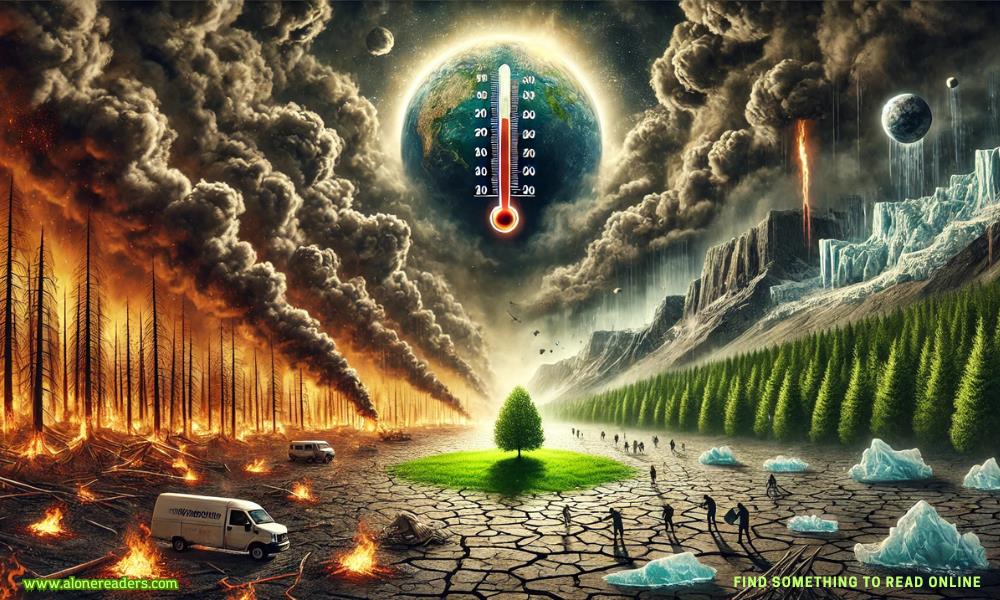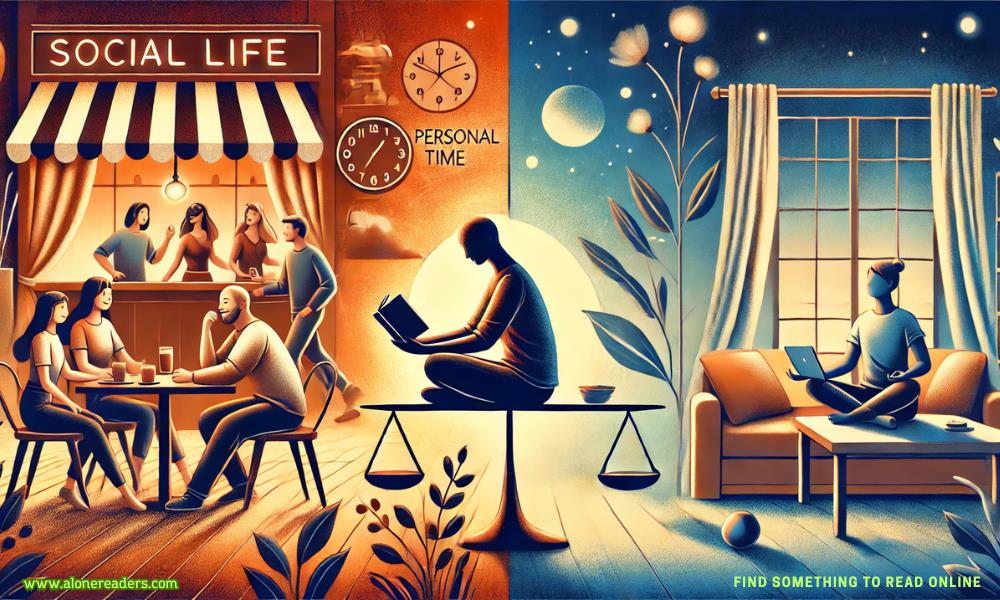Page 83 of Until Forever Falls
“Would you still?”
His question is a scalpel, cutting clean through my defenses. Would I stay? Now? I barely know what that means anymore. I mean, New York was never really home, just a place I existed. And even if I wanted to return, what would be the point? The city wouldn’t notice my absence, my nearly empty apartment wouldn’t miss me, and Aaron. He was always meant for more than I could ever give him. We both know that now.
“I would.” The conviction in my voice seals off any room for doubt and I scrape my thumbnail against my knuckle, needing the sensation to remind me this is real. “For Blake. I can’t pretend like she doesn’t change everything. I’ve spent so long convincing myself that my choice to leave made sense, that I was exactly where I was supposed to be. Gone.”
I let out a breath that feels stolen from a version of me who never thought she’d say this. “But I wasn’t. I was lost, I just didn’t realize it until tonight. Knowing Blake’s been here all this time—that I’ve missed so much of her life—made it impossible to keep lying to myself.”
“So what happens next? What about your life in New York?”
I touch my necklace absently, a habit born from needing something to hold on to. “The life I built there wasn’t real, Brooks. It was a placeholder, something to keep me moving so I wouldn’t have to face the wounds I never let heal. Blake is proof that not everything in this town is stained with the memory of what I lost. Beckett.You.” My gaze drops to his hands, to the space between us, to the past and future colliding.
“My time in Rockport was brief, but it was real, and somehow it became the only place I ever felt at home. Staying feels like the first step to finding my way back to that.”
“So stay, Dylan. Not because of Blake. Or me. Stay because this is where you finally let yourself belong.” I take him in—the slight furrow between his brows, the worry settling in the creases at the corners of his eyes. And just like that, I know. He’s never been anything less than everything. My heart has belonged to him since that first bonfire, since the flames cast their glow across his face and made me believe, if only for a moment, that some things are meant to burn forever. Maybe not as we once did, but as something that still matters.
“After I read your letter, I realized I’ve spent the last decade treating my grief like a place to live. I barricaded myself in it, let it decide who I was allowed to be. I built a life so small it couldn’t hurt me, one without color, without anything real enough to lose.”
My breath hitches as I press my fingers into my collarbone and force myself to keep going. “Because of that, I haven’t touched a paintbrush since I left. The idea of it made me sick. Because Beckett was in everything I tried to create. So I didn’t. I refused. I lost the one outlet that helped me make sense of the world.”
I roll my shoulders back, forcing myself to stand in the moment instead of running from it. “But you…and Blake have opened my eyes again. I have to stop living like a shadow of someone I don’t recognize anymore. Staying would be for me, but it’s because of the two of you that I can finally seewhyit matters. I may never be who I was before, but if it leads me to something worth holding onto again, then maybe that’s enough.”
The wind picks up, threading through pine trees that line the beach, their branches shifting like restless hands against the sky. “You don’t owe anyone the person you used to be,” he says, his voice carrying through the breeze with a quiet certainty. “I just want you here, and I’m sure Blake will too. Take it slow, see where things fall. We’re not demanding anything.”
A restless gust catches my curls, blowing them across my face. I brush them back but the moment stills—something shifting within me, a question that’s been pressing against my chest, demanding its turn since I called him.
“I don’t want to cross any lines, Brooks, but…” I pause, gathering my thoughts carefully. “Can you tell me about your cancer? If you don’t want to share, that’s okay. Are you still fighting it?”
His shoulders tighten, and he tugs at his jacket, vibrant green eyes flicking to the side as if searching for an escape before returning back to meet mine.
“I’m not trying to cross any boundaries,” I say gently.
The truth is already there between us, waiting to be acknowledged. He simply gives it shape. “You’re not crossing a boundary. It’s just…it’s been a while since I’ve let myself put it all into words. But no, I’m not.”
I stay still, letting the conversation breathe, making sure he knows the choice to continue is his.
“Um.” His voice bends, as if carrying too much for one breath to hold. “The first few months, I was convinced I’d die anyway, so nothing felt like it mattered. But eventually, I told myself that if I just kept going—if I refused to acknowledge death—I could beat it. The doctors, the treatments, the way my parents looked at me like I was already gone. I shoved it all down and acted like it couldn’t touch me.” He stares at a fixed point in the distance, as if the horizon might hold the words he’s struggling to find.
“Chemo hit me like a wrecking ball, leaving nothing untouched. I lost weight, lost my hair, lost the ability to feel like myself in the mirror. I spent so much time throwing up that I forgot what it felt like to be hungry.” His words thin out. “My body didn’t belong to me anymore—it belonged to the disease, to the medicine trying to kill it, to the doctors deciding how much poison I could take before I broke.” He presses his thumb against the inside of his wrist, like he’s checking to see if he’s still here.
“And I did break. Over and over again. But I kept going, because what the hell else was I supposed to do? There were days I swore I wasn’t going to make it, nights I laid awake wondering if my heart would just stop in my sleep. Sometimes I thought that would have been easier.” He laughs, but there’s nothing light in it—just depletion.
“The worst part? It wasn’t the pain. It was waiting.” He presses the tip of his shoe into the sand, twisting it back and forth, burying it deeper. “The scans, the tests, the people who looked at me like a fucking puzzle missing half its pieces. The ‘maybes’, the ‘we’ll sees’, the ‘let’s hope for the best.’” He shakes his head. “That’s what no one tells you—it’s not just a fight. It’s a waiting game. Every test result a coin flip, and you’re the one waiting to see if it lands heads or tails.” Pulling his foot back, he kicks up a soft cloud of sand that scatters in the wind, disappearing too easily—too much like everything he’s lost.
“The years passed, and somehow, I was still here. But surviving isn’t the same as living, Dylan. And I didn’t live—I just existed for a long time.”
His words land with a nerve deep burn that doesn’t ask for permission. They don’t demand, or twist the knife—just settle, heavier than I expect. I sit with them, he’s choosing to share this with me, despite everything we’ve been through. A piece of me grips onto the anger, the betrayal. It’s familiar, easier to carry. But beneath it, something quieter stirs, something that has nothing to do with rage. Sorrow. Not just for what we both lost, but for the version of us that never had the chance to exist, for the story that faded before it could be written.
“I didn’t see it back then,” I confess, taking a deep breath. “But now, I get it. Why you made the choices you did, and I can’t hold that against you, B.”
It’s not about changing the past or wishing for another chance. It’s about accepting what happened, and finding a way to move forward, unburdened by it.
“When the doctors said I was in remission, I thought there’d be this…release. Like I’d finally gotten my life back. But I didn’t feel that way. Instead, I felt more disconnected than ever. I was still searching for something, but I didn’t know what.”
The despair in his voice is palpable, and I can nearly picture the version of him that never got the chance to find peace, the person lost to that struggle.
“So, I did the thing I promised myself I’d never do,” he admits, his tone laced in contempt. “I put my camera away, went to work for my dad, and buried myself in routine. At the time, I thought it was what I needed—something safe, predictable. Like I said, I was existing, merely drifting through my own life. And then one day, I passed the old church.” His attention drifts down, colliding with mine in a way that steals my breath. “Something pulled me in. And when I stepped inside, it felt like it was begging to be revived, waiting for me to breathe life back into it. In its own way, it did the exact same thing for me.”
“That’s when you decided to open The Drift?”
- The Sheik's Embrace by Elizabeth Lennox
- Sofa King Cute by Alexa Riley
- Family Bonds- Garrett & Justine by Natalie Ann
- Stolen Dreams by Natasha Madison
- Vendetta Crown by Brook Wilder
- Vendetta Vows by Brook Wilder
- Born into Darkness by Sonja Grey
- His Virgin Wife by Sam Crescent
- The Princess and the Pack by Fallon English
- Revival by A.M. Wilson
- Reclaimed by A.M. Wilson
- Atonement by Evelyn Montgomery
- Some Like It Royal by Heather Long
- Protected By Saint by Cassi Hart
- Getting Lucky in London by Darah Lace
- A Man of Power by S.E. Rose







